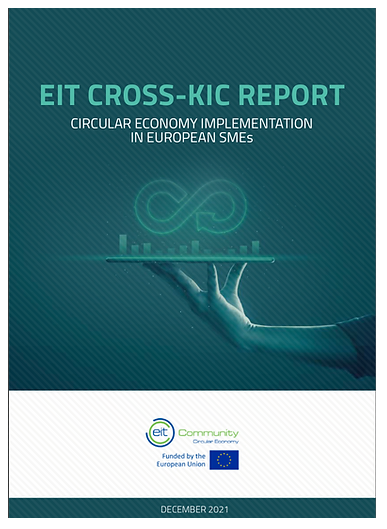Over the last months, the Center for Responsible Business & Leadership team has been involved in a coordinated and efficient collaboration with the startup accelerator Building Global Innovators (BGI) and six Knowledge and Innovation Communities (KICs) to facilitate the transition of Small and Medium Enterprises (SMEs) to a circular economy (CE).
As result, we had recently launched a Cross-KIC Report entitled "Circular Economy Implementation In European SMEs", which can be consulted here.
Within the scope of the European Institute of Innovation and Technology (EIT), these six communities - EIT RawMaterials, EIT Climate-KIC, EIT Digital, EIT Food, EIT Manufacturing, and EIT Urban Mobility - aim to fulfill one of the main strategic initiatives of the European Union: to contribute to a resource-efficient and carbon-neutral economy, known as the Circular Economy.
The main objective of the report is to detail the key obstacles and challenges encountered by European SMEs in improving the efficiency of their resources.
Some of the challenges identified were, among others, the companies' lack of environmental culture, lack of financial support, and lack of capacity to integrate adequate legislation and circular economy practices into their business models.
Geographically, it was also possible to observe that European startups reveal to have a greater focus on the Circular Economy (3%) than North American startups (2%) and startups located in Asia-Pacific (1%), which represents the efforts made by the EU towards circularity. The future perspective is now to increase the proportion of startups concerned with this issue, facilitating their access to incentives,monetary funds and tools, that will allow them to step forward on this topic.
After analyzing the indicators that measure CE in Europe, it was found that there is a large amount of funding available to SMEs, as well as a variety of public and private funds available for Circular Economy activities. Between 2016 and 2020, 28.77 billion euros were invested in EC. However, despite the existence of a significant amount of financing for companies, a significant proportion of them still depend on self-financing.
What do we recommend to acelerate CE in European SMEs?
The recommendations for the future involve:
- aligning companies with the principles of Circular Economy and the Sustainable Development Goals (SDGs);
- raising awareness of these principles through training and workshops;
- measuring and monitoring the progress of SMEs with the 2030 Agenda;
- and linking company objectives to incentives.
It is also recommended to promote partnerships between SMEs and other organizations for the elaboration of circular projects in the European context, and the creation of support networks where SMEs can share best practices and learn from each other.
Those interested in finding out more about this topic can do so by accessing the official presentation of the report here.
Have a great and impactful week!
The Center for Responsible Business & Leadership and Building Global Innovators team
This article refers to edition #126 of the "Have a Great and Impactful Week" Newsletter and covers SDGs 12 and 17.
Subscribe here to receive the weekly newsletter!
